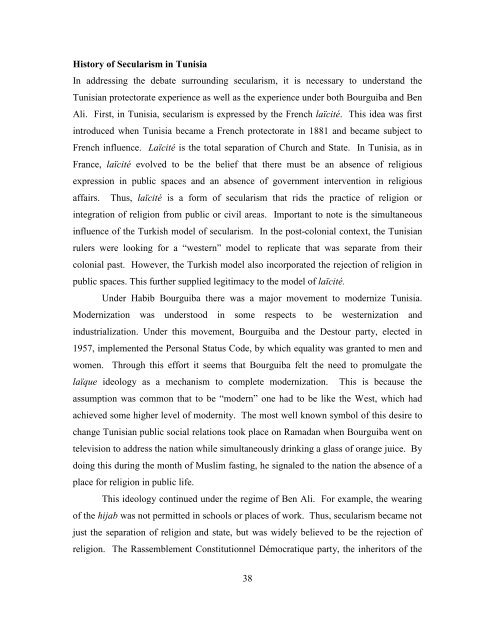Tunisia: Understanding Conflict 2012 - Johns Hopkins School of ...
Tunisia: Understanding Conflict 2012 - Johns Hopkins School of ...
Tunisia: Understanding Conflict 2012 - Johns Hopkins School of ...
You also want an ePaper? Increase the reach of your titles
YUMPU automatically turns print PDFs into web optimized ePapers that Google loves.
History <strong>of</strong> Secularism in <strong>Tunisia</strong><br />
In addressing the debate surrounding secularism, it is necessary to understand the<br />
<strong>Tunisia</strong>n protectorate experience as well as the experience under both Bourguiba and Ben<br />
Ali. First, in <strong>Tunisia</strong>, secularism is expressed by the French laïcité. This idea was first<br />
introduced when <strong>Tunisia</strong> became a French protectorate in 1881 and became subject to<br />
French influence. Laïcité is the total separation <strong>of</strong> Church and State. In <strong>Tunisia</strong>, as in<br />
France, laïcité evolved to be the belief that there must be an absence <strong>of</strong> religious<br />
expression in public spaces and an absence <strong>of</strong> government intervention in religious<br />
affairs. Thus, laïcité is a form <strong>of</strong> secularism that rids the practice <strong>of</strong> religion or<br />
integration <strong>of</strong> religion from public or civil areas. Important to note is the simultaneous<br />
influence <strong>of</strong> the Turkish model <strong>of</strong> secularism. In the post-colonial context, the <strong>Tunisia</strong>n<br />
rulers were looking for a “western” model to replicate that was separate from their<br />
colonial past. However, the Turkish model also incorporated the rejection <strong>of</strong> religion in<br />
public spaces. This further supplied legitimacy to the model <strong>of</strong> laïcité.<br />
Under Habib Bourguiba there was a major movement to modernize <strong>Tunisia</strong>.<br />
Modernization was understood in some respects to be westernization and<br />
industrialization. Under this movement, Bourguiba and the Destour party, elected in<br />
1957, implemented the Personal Status Code, by which equality was granted to men and<br />
women. Through this effort it seems that Bourguiba felt the need to promulgate the<br />
laïque ideology as a mechanism to complete modernization. This is because the<br />
assumption was common that to be “modern” one had to be like the West, which had<br />
achieved some higher level <strong>of</strong> modernity. The most well known symbol <strong>of</strong> this desire to<br />
change <strong>Tunisia</strong>n public social relations took place on Ramadan when Bourguiba went on<br />
television to address the nation while simultaneously drinking a glass <strong>of</strong> orange juice. By<br />
doing this during the month <strong>of</strong> Muslim fasting, he signaled to the nation the absence <strong>of</strong> a<br />
place for religion in public life.<br />
This ideology continued under the regime <strong>of</strong> Ben Ali. For example, the wearing<br />
<strong>of</strong> the hijab was not permitted in schools or places <strong>of</strong> work. Thus, secularism became not<br />
just the separation <strong>of</strong> religion and state, but was widely believed to be the rejection <strong>of</strong><br />
religion. The Rassemblement Constitutionnel Démocratique party, the inheritors <strong>of</strong> the<br />
38
















